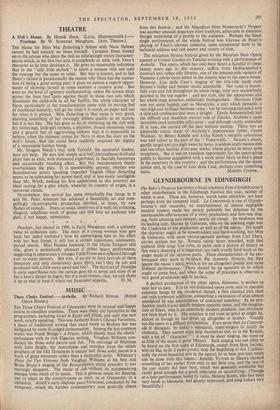MUSIC
Three Choirs Festival—Arabella. By Richard Strauss. (Royal Opera House.) THE Three Choirs Festival at Gloucester went its normal and happy course in cloudless sunshine. There were many old favourites in the programmes, including Israel in Egypt and Elijah, and only one new work, strictly speaking. This was Anthony Scott's Chorale Variations, a piece of traditional writing that owed much to Brahms but was disfigured by some ill-judged orchestration. Among the less common works was Frank Bridge's A Prayer, which plainly fired the choirs' enthusiasm with its rich Elgarian writing. Vaughan Williams con- ducted his Dona nobis pacem and Job. The marriage of Whitman with John Bright, the Apocalypse and snatches from the minor prophets of the Old Testament is uneasy and Dona nobis pacem is a work of great moments rather than a successful unity. Whitman's Dirge for Two Veterans finds Vaughan Williams at his best .and Bruce Boyce's singing of the Reconciliation, which precedes it, was movingly eloquent. The music of Job without its accompanying masque loses much of its point. This is genuine music for dancing, out of place in the concert-room or even, as at Gloucester, in a cathedral. Arnell's early Sinfonia quasi Variazioni, conducted by the composer, struck the harsher contemporary note generally absent from this festival ; and the Magnificat from Monteverdi's Vespers was another unusual departure from tradition, admirable in intention though something of a puzzle to the audience. Perhaps the finest single performance of the whole festival was Gervase de Peyer's playing of Finzi's clarinet concerto, quite exceptional both in its technical address and rich poetry and variety of tone.
The miniature Strauss festival given by the Bavarian State Opera opened at Covent Garden on Tuesday evening with a performance of Arabella. This opera, which has only been heard a handful of times twenty years ago in this country, suffers from Hofmannsthal's involved and rather silly libretto, one of the innumerable variants of Viennese Liebelei more suited to the cinema than to the opera-house. However, Lisa della Casa's singing of the title-role made even Strauss's duller and thinner music acceptabld. Her voice is beauti- fully even and full throughout its whole range, only very occasionally pinched in the top register ; and her style, like her appearance and her whole stage presence, unfailingly distinguished. Hermann Uhde was not quite happily cast as Mandryka, a part which demands a very high and brilliant baritone voice ; but he too sang and acted with a style and confidence that were a delight. Gerda Sommerschuh had the difficult and thankless travesti role of Zdenka, Arabella 's quite incredible (and incredibly silly) sister ; and although visibly somewhat ill at ease, she carried off the part without mishap. There was an admirable comic study of Arabella 's impecunious father, Count Waldner, by Benno Kusche and Erika Koeth's metallic coloratura was well suited to the part of the " Fiakermilli." 'Strauss's music, gustily turgid and cloyingly sweet by turns, is seldom really memorable and too often familiar from past works, whose glories he never quite recaptures. But it was an excellent opportunity for the opera-going public to become acquainted with a work never likely to find a place in the repertory in this country ; and the performance did the music justice and, in the case of Lisa della Casa, perhaps even something


































 Previous page
Previous page